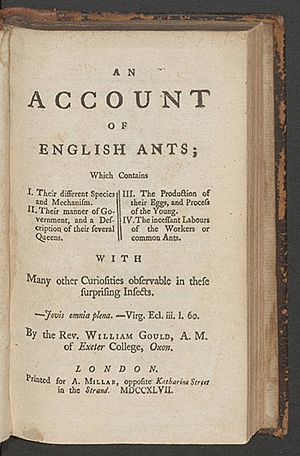William Gould (naturalist) facts for kids
William Gould (1715 – 1799) was an English clergyman and a naturalist, which means he studied nature. He is often called "the father of British myrmecology" by scientists like Horace Donisthorpe. Myrmecology is a special part of entomology (the study of insects) that focuses only on ants.
Life and Career
William Gould was born in Sharpham Park, Glastonbury, Somerset, England. He was the son of Davidge Gould. When he was 17, he went to Exeter College at Oxford University in 1732. He earned his first degree in 1736.
Later, he became the Rector (a type of church leader) of Stapleford Abbotts in Essex. In May 1774, he was chosen to be a Fellow of the Royal Society. This is a very respected group of scientists.
An Account of English Ants
Gould is most famous for his book, An Account of English Ants, which was published in London in 1747. This book was the very first scientific paper written specifically about ants. It was 109 pages long and brought together all the observations about ants known at that time.
When the book was published, it caused some discussion. Gould, even though he was a clergyman, wrote that his observations about ants were different from what was written in the Bible. Specifically, the Book of Proverbs (Proverbs 6:6-8) said:
- "Go to the ant, thou sluggard; consider her ways and be wise; which having no chief, overseer, or ruler, provideth her bread in the summer, and gathereth her food in the harvest."
However, Gould's studies showed that the British ant species he knew did not store grain. Because of this scientific finding, he faced criticism from the church.
Despite the debate, Gould's book is still an important early record in ant observation and the science of myrmecology. He only recognized a few types of ants, which he called "hill ants," "jet ants," "red ants," "common yellow ants," and "small black ants."
His work in the book was divided into four main parts:
- Their different Species and Mechanism (Different Kinds of Ants and How They Work)
- Their manner of Government, and a Description of their several Queens (How Ant Colonies are Organized and Their Queens)
- The Production of their Eggs, and Process of the Young (How Ants Lay Eggs and Their Young Develop)
- The incessant Labours of the Workers or common Ants (The Hard Work of Worker Ants)
See also
- Myrmecology for a list of other notable ant scientists.
 | James Van Der Zee |
 | Alma Thomas |
 | Ellis Wilson |
 | Margaret Taylor-Burroughs |


